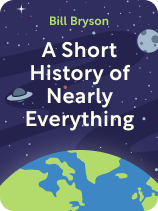

This article is an excerpt from the Shortform book guide to "A Short History of Nearly Everything" by Bill Bryson. Shortform has the world's best summaries and analyses of books you should be reading.
Like this article? Sign up for a free trial here.
How is it that the universe’s parameters are “just right” to support life? Can science ever solve this mystery?
In his book A Short History of Nearly Everything, Bill Bryson discusses a few of the unknowns and controversies that still exist in the sciences. One of those is the “fine-tuning problem.”
Continue reading to learn about the fine-tuning of the universe and why it has many scientists scratching their heads.
Fine-Tuning of the Universe
One unsolved question in science is the fine-tuning of the universe: Many parameters of the universe seem to have been optimized to just the right values that would support human life. For example, if the initial expansion rate of the universe had been just a little faster, matter would never have clumped up enough to form stars and galaxies, which are necessary for life. But if it had been just a little slower, the universe would have collapsed back in on itself before solar systems like ours could form.
(Shortform note: In A Brief History of Time, physicist Stephen Hawking explains how the ‘inflationary’ version of the big bang theory largely explains why the expansion rate of the universe is what it is. But Hawking, too, discusses the fine-tuning problem and acknowledges that there are other factors that inflation theory, by itself, doesn’t explain.)
Yet, scientists have not identified any physical principle or mechanism that would constrain all these parameters to have just the right values to eventually support life on Earth—aside from the fact that, if any of these parameters were different, we wouldn’t be here to wonder why. Bryson notes that some scientists postulate there must be an infinite number of universes, each differing just slightly from one another, but other scientists dismiss this idea as unscientific, since, by definition, it is impossible to observe other universes.
(Shortform note: Stephen Hawking is one of the scientists who dismisses the infinite-number-of-universes explanation. In A Brief History of Time, Hawking suggests that when a theory that unifies general relativity with quantum mechanics is found, it will likely solve the fine-tuning problem by showing that the parameters in question are not really arbitrary. Because of the probabilistic nature of quantum mechanics, a unifying theory would also have to be probabilistic, and Hawking expects that it would indicate the “fine-tuned” parameters have a high probability of adopting their observed values.)
Bryson himself conjectures that maybe the answer is that life evolved to match the conditions that existed. So the universe isn’t fine-tuned for us—we’ve been fine-tuned for it by millions of years of natural selection.
(Shortform note: The scientific community probably views Bryson’s suggestion as a limited solution to the problem. It might explain why parameters like Earth’s chemical composition and climate seem uniquely suited to supporting Earth’s life forms, but there are limits to the range of conditions that could conceivably support any form of life. Deviations beyond a certain range could create conditions outside these limits.)

———End of Preview———
Like what you just read? Read the rest of the world's best book summary and analysis of Bill Bryson's "A Short History of Nearly Everything" at Shortform.
Here's what you'll find in our full A Short History of Nearly Everything summary:
- An accessible overview of the natural sciences
- A full history of the universe, Earth, and life as we know it
- A look at the unknowns and controversies that still exist in the sciences






